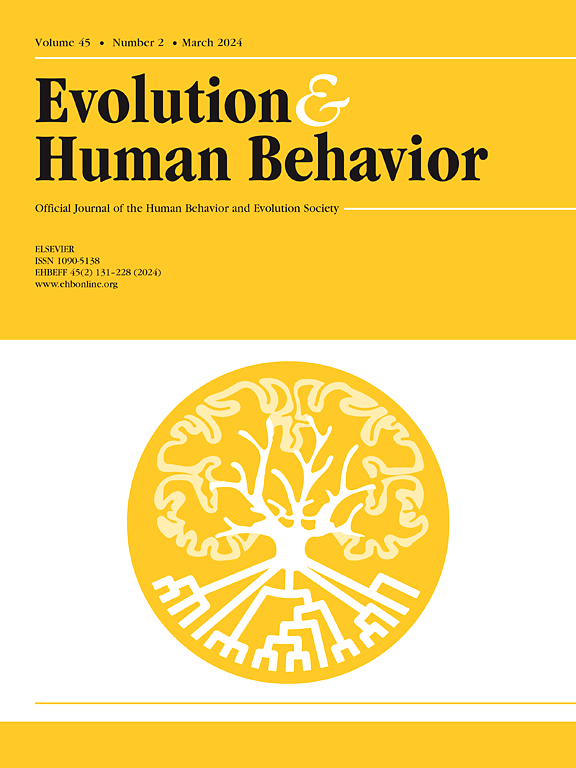进化道德心理学:来自韦斯特马克的教训
IF 3.2
1区 心理学
Q1 BEHAVIORAL SCIENCES
引用次数: 0
摘要
爱德华·韦斯特马克(Edward Westermarck)是研究人类行为的现代进化方法的先驱,他以避免乱伦的工作而闻名,而他的遗产的其他重要方面仍未得到重视。本文认为,韦斯特马克的道德情感理论——可以说是迄今为止最全面的道德进化理论——为研究道德判断的情感和进化起源提供了一个有价值的分析框架。它对韦斯特马克的核心思想进行了简明的综合,重点关注道德上的反对或愤慨如何类似于愤怒并激发惩罚,而道德上的赞同或赞扬如何类似于感激并激发奖励。这些道德情感与愤怒和感激的不同之处在于它们明显的无私、公正和普遍性,它们根植于人类的社会本性。它们产生于同情、情绪传染、厌恶和厌恶以及违反规范。除了韦斯特马克的道德心理学之外,本文还考察了他关于家庭形成和亲属关系的工作,因为它们与道德有关。它强调了与人类合作的关键理论的联系,包括亲缘选择、互惠利他主义、间接互惠和基因-文化共同进化。文章最后将韦斯特马克关于避免乱伦和禁忌乱伦的研究与他的道德情感理论联系起来进行探讨。它澄清了关于乱伦禁忌的文献中的歧义,并说明了个人厌恶如何导致跨各个领域的社会文化禁止。除了基于厌恶的规则外,Westermarck还提出了基于同情的规则理论,这一理论同样重要。本文章由计算机程序翻译,如有差异,请以英文原文为准。
Evolutionary moral psychology: Lessons from Westermarck
Edward Westermarck, a pioneer of modern evolutionary approaches to human behavior, is best known for his work on incest avoidance, while other significant aspects of his legacy remain unappreciated. This article argues that Westermarck's theory of moral emotions—arguably the most comprehensive evolutionary account of morality to date—offers a valuable analytical framework for investigating the emotional and evolutionary origins of moral judgments. It presents a concise synthesis of Westermarck's core ideas, focusing on how moral disapproval or indignation resembles anger and motivates punishment, while moral approval or praise resembles gratitude and motivates reward. These moral emotions differ from anger and gratitude in their apparent disinterestedness, impartiality, and generality, grounded in human social nature. They arise from sympathy, emotional contagion, aversion and disgust, and norm violations. In addition to Westermarck's moral psychology, the article examines his work on family formation and kinship as they relate to morality. It highlights connections to key theories of human cooperation, including kin selection, reciprocal altruism, indirect reciprocity, and gene-culture coevolution. The article concludes by exploring Westermarck's work on incest avoidance and the incest taboo in relation to his theory of moral emotions. It clarifies ambiguities in the literature on the incest taboo and illustrates how individual aversions can lead to sociocultural prohibitions across various domains. In addition to aversion-based rules, Westermarck also proposed a theory of sympathy-based rules, which is equally significant.
求助全文
通过发布文献求助,成功后即可免费获取论文全文。
去求助
来源期刊

Evolution and Human Behavior
生物-行为科学
CiteScore
8.30
自引率
9.80%
发文量
62
审稿时长
82 days
期刊介绍:
Evolution and Human Behavior is an interdisciplinary journal, presenting research reports and theory in which evolutionary perspectives are brought to bear on the study of human behavior. It is primarily a scientific journal, but submissions from scholars in the humanities are also encouraged. Papers reporting on theoretical and empirical work on other species will be welcome if their relevance to the human animal is apparent.
 求助内容:
求助内容: 应助结果提醒方式:
应助结果提醒方式:


